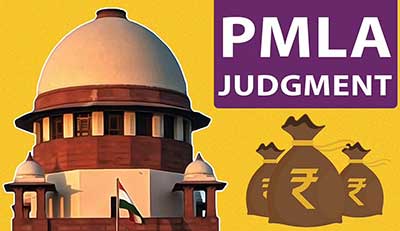Relevance: GS-2: Governance, Transparency & Accountability, Judiciary, Citizens Charters
Key Phrases: Prevention of Money Laundering Act (PMLA), Money Laundering, Enforcement Directorate, Supreme Court, Money Bill, State Arbitrariness
Why in News?
- Supreme Court, in Vijay Madanlal Choudhary and Ors versus Union of India case, has upheld the Prevention of Money Laundering Act (PMLA), 2002, and retained the powers of the Enforcement Directorate (ED).
What is PMLA, 2002?
- The Prevention of Money Laundering Act (PMLA) was introduced in 2002, to tackle the problem of money laundering. It has been subject to several amendments since then.
- It enables the Government or the public authority to confiscate the property earned from the illegally gained proceeds.
What is Money Laundering?
- Section 3 of the PMLA says whosoever is directly or indirectly involved in any process or activity connected with proceeds of crime and projecting it as untainted property shall be guilty of the offence of money laundering.
Criticisms of PMLA, 2002
Though the Supreme Court has upheld the constitutionality of the Act. However there are some grounds of criticism with regard to the Money Laundering Act.
- It raises question on Indian jurisprudence, making a state of exception, which is limited to grave issues like terrorism, a new norm.
- It also changes the presumption of innocence which is the basis of Criminal Jurisprudence.
- The definition of crime under this Act is elastic and not fixed, which gives the sovereign state the power to define any financial crime as a money laundering crime.
- The various codes within this law have an exceptional procedure of their own that can trump the safeguards of the Criminal Code of Procedure.
- Punishments under this law may potentially be excessively punitive, in disproportion to the crime.
- Recently SC categorically said that the process should not become punishment, however in the said law, the process is the punishment, where assets of the accused can be seized, and he can be jailed without bail till the proceedings are complete.
- Though in theory, the law provides safeguards against attaching properties, those safeguards are weak and do not allow for even reasonable exceptions that might be necessary for the accused's dignity or continuing with his business or livelihood.
- Mere possession of the proceeds of a crime, without any surrounding consideration of how it came to be in possession, makes it an offence, this presumption is flawed.
- State officials dealing with the law have not been classed as police, but they, in some respects, have even more power than the police.
- The law was enacted by using the means of Money Bill, and therefore lacks the rigorous analysis of the parliamentary debates and proceedings.
- The conviction rate under this law is very low, less than five per cent, even then a good number of cases are being registered, and people are arrested, and lives are turned upside down.
- In the context of a low conviction rate, the argument that the conditions of bail should be more stringent seems even more like, “let the process punish”.
- The use of the ED, particularly against political opponents, has risen exponentially in recent times.
- International treaties are used to justify the draconian provisions and to override domestic rights safeguards, however, the progressive provisions of such international laws are ignored.
Conclusion
- Though Money Laundering is a grave criminal offence and it needs a stringent law to deal with
- Any legislation should be based on parliamentary scrutiny, and firmly follow the Rule of Law, in which basic tenets of Criminal Jurisprudence should be maintained,
- Citizens should not be at the mercy of an arbitrary and opaque lawgiver,
- Civil liberties should be respected, and the arbitrariness of the state executive must be checked.
Source: Indian Express
Mains Question:
Q. Critically examine the provisions of the Prevention of Money Laundering Act (PMLA) vis-a-vis state arbitrary powers over citizens. (250 words).








